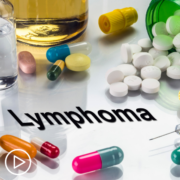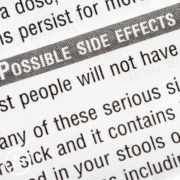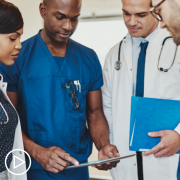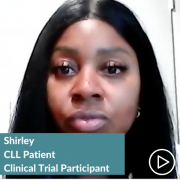How Can Patients Overcome Noted Diffuse Large B-Cell Lymphoma Disparities?
How Can Patients Overcome Noted Diffuse Large B-Cell Lymphoma Disparities? from Patient Empowerment Network on Vimeo.
How can diffuse large B-cell lymphoma (DLBCL) patients overcome noted care disparities? Expert Dr. Nirav Shah from Medical College of Wisconsin explains some common factors that impact DLBCL care and how the gap in care can be bridged for more equitable care for all.
Dr. Nirav Shah is an Associate Professor at the Medical College of Wisconsin. Learn more about Dr. Shah.
[ACT]IVATION TIP:
“..we all need to do a better job of educating our community, of making people aware that these options are available, and then also facilitating patients who have less money, patients who have less resources to be able to provide them what they need to be able to get the treatments that are best for them.”
See More from [ACT]IVATED DLBCL
Download Resource Guide en español
Related Resources:
Transcript:
Lisa Hatfield:
So what are the noted disparities that are seen in DLBCL? Sometimes we talk about clinical trials. Some people don’t have access to those clinical trials, what are other disparities, and how can patients overcome those to get the best outcome?
Dr. Nirav N. Shah:
Yeah, absolutely. So I think that America is an incredibly large and diverse country. I think we know that by just watching the news with people of all walks and colors, and different opinions on how they view their world. And so I think one simple bias is I am a lymphoma specialist at an academic center. However, I live in a larger city, in the city of Milwaukee and covering a geographic area, even of the size of the state of Wisconsin, not everybody has access to this center. Some of my patients have to drive three, four, or five hours away to get complex treatments that aren’t even available in the community or even have the opportunity for clinical trials, which are most often centered in larger academic centers.
So I think that just simple geography is an issue that creates accessibility and impacts the type of care that a patient is able to get. I think beyond that, there are obviously economic factors that drive a patient’s ability to get specialized treatment. Do they have money to afford the gas to get to a larger center? Do they have the resources or the support system available to get a complex therapy where you would need those treatments, especially for relapsed disease? And then I think there are always going to be racial factors and accessibility issues that happen, where patients aren’t referred in time or patients aren’t getting necessarily the best care that they can.
So I know that in the world of diffuse large B-cell lymphoma, we have lots of great treatments, which is the exciting part for me. My biggest concern remains that not all of those treatments are accessible to all the patients that they need them, and I think we all need to do a better job of educating our community, of making people aware that these options are available, and then also facilitating patients who have less money, patients who have less resources to be able to provide them what they need to be able to get the treatments that are best for them.
Share Your Feedback:
Create your own user feedback survey













